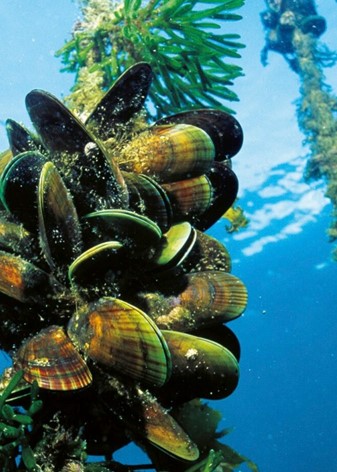Camille Lutet-Toti PhD thesis
 Zero pollution: recycling sea by-products of shellfish farming – Search for bactericidal biomolecules in the shell of mollusks of economic interest
Zero pollution: recycling sea by-products of shellfish farming – Search for bactericidal biomolecules in the shell of mollusks of economic interest
Started in november 2021
Funding: University of Bologna grant for the international programme FishMed-PhD
Supervisors: Frédéric Marin (uB), Stefano Goffredo (UniBo) & Giuseppe Falini (UniBo)
Abstract
To calcify their shells, molluscs secrete macromolecules (mainly proteins) that regulate the setting up of the crystalline units and remain included in the mineral phase. High-throughput proteomics techniques backed by transcriptomes show the complexity of this calcifying matrix, which has many molecular functions, including potential bactericidal power revealed by the presence of highly basic peptides contained in the matrix. This exploratory project first seeks to demonstrate in vitro the bactericidal capacity of calcifying shell matrices extracted from molluscs of economic interest mussel, oyster, prairie, scallop, sea almond, etc.); then, to test their effectiveness in stemming the bioerosion of carbonated geomaterials by endolithic microorganisms, in particular perforating cyanobacteria. This research project is at the interface of environmental geosciences, aquaculture and health, but also of museology and cultural heritage conservation sciences. Its purpose is to valorise — through a sophisticated application — a very abundant co-product of the sea: the empty shells from common shellfish consumption which are only recycled with low added value (soil amendment, poultry feed supplements, coastal embankments). Thus, in the medium term, this project aims to establish a virtuous circular economy.
Keywords
mollusc, shell, biomineralization, shell matrix, bactericide
Thesis advisory panel
Stéphanie Auzoux-Bordenave, UMR BOREA MNHN/CNRS/UPMC/IRD
Antoine Serpentini, UMR BOREA MNHN/UCN
- extrait:
- lien_externe:
- titre:
- Pollution zéro : recyclage de coproduits de l'activité conchylicole - Recherche de biomolécules bactéricides dans la coquille de mollusques d'intérêt économique
- date_de_debut_these:
- novembre 2021
- nom:
- Lutet-Toti
- date_de_debut_these_numerique:
- 202111
- kc_data:
- a:8:{i:0;s:0:"";s:4:"mode";s:0:"";s:3:"css";s:0:"";s:9:"max_width";s:0:"";s:7:"classes";s:0:"";s:9:"thumbnail";s:0:"";s:9:"collapsed";s:0:"";s:9:"optimized";s:0:"";}
- kc_raw_content:
 Zero pollution: recycling sea by-products of shellfish farming - Search for bactericidal biomolecules in the shell of mollusks of economic interest
Zero pollution: recycling sea by-products of shellfish farming - Search for bactericidal biomolecules in the shell of mollusks of economic interestStarted in november 2021
Funding: University of Bologna grant for the international programme FishMed-PhD
Supervisors: Frédéric Marin (uB), Stefano Goffredo (UniBo) & Giuseppe Falini (UniBo)
Abstract
To calcify their shells, molluscs secrete macromolecules (mainly proteins) that regulate the setting up of the crystalline units and remain included in the mineral phase. High-throughput proteomics techniques backed by transcriptomes show the complexity of this calcifying matrix, which has many molecular functions, including potential bactericidal power revealed by the presence of highly basic peptides contained in the matrix. This exploratory project first seeks to demonstrate in vitro the bactericidal capacity of calcifying shell matrices extracted from molluscs of economic interest mussel, oyster, prairie, scallop, sea almond, etc.); then, to test their effectiveness in stemming the bioerosion of carbonated geomaterials by endolithic microorganisms, in particular perforating cyanobacteria. This research project is at the interface of environmental geosciences, aquaculture and health, but also of museology and cultural heritage conservation sciences. Its purpose is to valorise — through a sophisticated application — a very abundant co-product of the sea: the empty shells from common shellfish consumption which are only recycled with low added value (soil amendment, poultry feed supplements, coastal embankments). Thus, in the medium term, this project aims to establish a virtuous circular economy.
Keywords
mollusc, shell, biomineralization, shell matrix, bactericide
Thesis advisory panel
Stéphanie Auzoux-Bordenave, UMR BOREA MNHN/CNRS/UPMC/IRD
Antoine Serpentini, UMR BOREA MNHN/UCN
